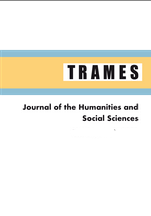ON SOCIAL EUROPE AFTER COVID-19
ON SOCIAL EUROPE AFTER COVID-19
Author(s): Martin AidnikSubject(s): Economic history, Economic policy, Security and defense, Political economy, Health and medicine and law, Transformation Period (1990 - 2010), Present Times (2010 - today), EU-Approach / EU-Accession / EU-Development
Published by: Teaduste Akadeemia Kirjastus
Keywords: social Europe; Europe; Covid-19; T-Dem; Eurozone;
Summary/Abstract: Europe, the old world, was the epicentre of Covid-19 after its initial emergence and incubation in China. Having resulted in vast human misery, the pandemic raises necessary questions about the future direction of Europe – what kind of Europe will emerge from the devastation – and, moreover, will the eruption of the European societies be used as an opportunity for changing, i.e. recalibrating Europe? The overarching concern of this article is social Europe, i.e. Europe with a commitment to ‘good society’, conducive to human wellbeing. The article analyses the response to the virus in Europe and by the European Union. It contextualizes the response within the framework laid by the Maastricht Treaty of 1992 and the handling of the sovereign debt crisis of 2010. Thereafter, I turn to the ‘Manifesto for the Democratization of Europe’ by leading French social thinkers from 2018, in order to discuss the reconstruction of the eurozone governance. I envision an alternative role for the European Central Bank: instead of continuing with the unsuccessful Quantitative Easing (QE) strategy, the ECB should use its capacity to pay people of Europe a temporal universal basic income, which could later be made permanent. Both the manifesto and universal basic income stand in tension to the status quo, yet remain firmly on the horizon of the possible – and necessary to restore human well-being to the guiding principles of the European political economy.
Journal: TRAMES
- Issue Year: XXV/2021
- Issue No: 2
- Page Range: 173-190
- Page Count: 18
- Language: English

